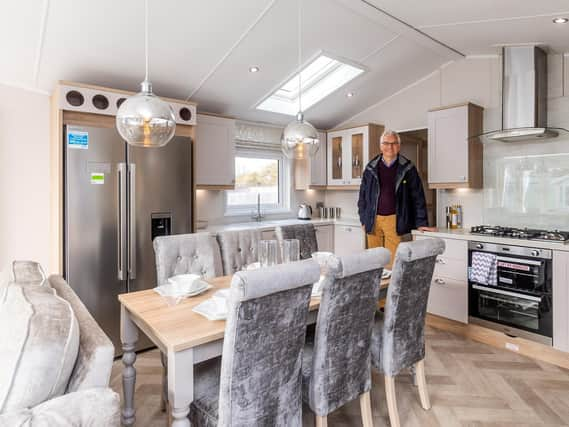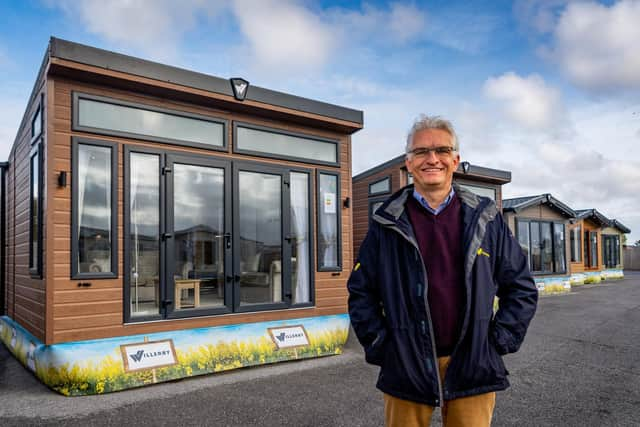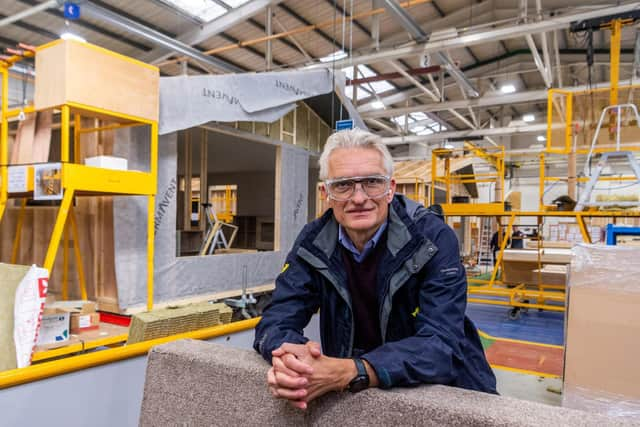'Like skiing down an avalanche' - how crisis created a boom for Hull-based Willerby Holiday Homes


The UK's largest caravan manufacturer, which is based in Hull, has gone from production being stopped for over two months with most staff furloughed to record numbers of orders pouring in during July, August and September.
The four production lines, which turn out 7,000 units a year, a third of the UK's total, are now booked out until next summer.
Advertisement
Hide AdAdvertisement
Hide Ad"July, August and September have been the three biggest order intake months in Willerby's 75-year history," said Mr Munk.


"I've not seen such a dramatic shift in consumer behaviour before.
"It has really been driven by the fact we are not allowed to be with the family. Being with the family is a powerful thing.
"People are spending money on their nest and we see our industry very much as extended nesting."
Advertisement
Hide AdAdvertisement
Hide AdTo understand the "completely different" mindset, the company, which was founded in 1946 by entrepreneurs Walter Allen and John Richardson in the west Hull village of Willerby, carried out consumer research in September.


"50 per cent of new buyers in 2020 have never been on a holiday park before which is mind-boggling, and is driving a lot of demand," said Mr Munk.
"If you take the whole family to Florida - and obviously you are not doing that this year - there's the deposit.
"People are taking control. They don't want the stress and hassle, they want to enjoy their holiday.
Advertisement
Hide AdAdvertisement
Hide Ad"People are more interested in long weekends and short stays and going out into rural areas."
Their showground in Hull, on the Old Imperial Typewriter site, off Marfleet Road, has a range of models to suit different age brackets and budgets - from the top-of-the-range tastefully beige Vogue Classic, with a big American fridge, wine cooler and air-conditioned bedrooms, which costs around £90,000 to £30,000 starter holiday homes.
Also for around £90,000, there's the new "twin lodge" product, showcased at the NEC last year, called the Mapleton, aimed at the younger, rental market, with a huge TV screen, with an equally large sofa, wooden floors, and high ceilings.
Recent restructuring has seen 41 workers mainly in administration lose their jobs, but Mr Munk says they expect to recruit up to 40 production workers over the next month.
Advertisement
Hide AdAdvertisement
Hide AdThey also hope to employ 25 young people, helping keep the specialist skills needed in the industry alive.
In a nearby factory, a team of 75 workers are turning out twin lodges at the rate of one every four-and-a-half days.
Amid a noisy hubbub, joiners and electricians fit out the empty half shells, which are built together so they fit perfectly.
Everything gets fitted on site from the cookers to the cupboards, with each unit on average requiring 4,000 components from 172 suppliers.
Advertisement
Hide AdAdvertisement
Hide AdMr Munk thinks Covid will have a major impact for a good while yet on foreign travel: "People will always go for the sunshine, but if there's just one per cent of people who before would go abroad consider buying a holiday home, that is more than double the demand we are seeing at the minute."
Holiday home history
Caravan manufacturing developed in Hull on the back of ready access to imported timber. The city is still the UK's leading softwood timber port centuries, after the trade was first established.
The fashion for staying put in a caravan dates back to the 1900s when well-to-do families - known as gypsy gentlemen - could have a caravan built and then taken by train and then road to a plot where it remained for the summer.
The early days saw caravanners pitch up in roadside laybys, but soon people were asking farmers to stop over on land, forming the first caravan sites.
Advertisement
Hide AdAdvertisement
Hide AdWith the boom in car ownership in the 1950s the static caravan allowed people to have their own cottage by the sea.
Static caravans continue to evolve in design. Mr Munk says: "A lot of people have childhood experiences of a really great family time, but not necessarily nice beds and cold caravans, and single glazing. All the units now have double glazing and central heating. The product has changed so much - mostly within the last 10 years.
"There is a very rapid change in terms of what consumers are expecting."
Comment Guidelines
National World encourages reader discussion on our stories. User feedback, insights and back-and-forth exchanges add a rich layer of context to reporting. Please review our Community Guidelines before commenting.